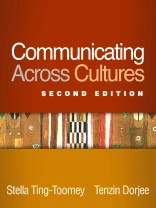This highly regarded text–now revised and expanded with 50% new material–helps students and professionals build their knowledge and competencies for effective intercultural communication in any setting. The authors’ comprehensive, updated theoretical framework (integrative identity negotiation theory) reveals how both verbal and nonverbal communication are affected by multilayered facets of identity. Written in a candid, conversational style, the book is rich with engaging examples illustrating cultural conflicts and misunderstandings that arise in workplace, educational, interpersonal, and community contexts. Readers learn how to transform polarized conversations into successful intercultural engagements by combining knowledge about culture with mindful listening and communication skills.
New to This Edition
*Extensively revised to reflect the ongoing development of integrative identity negotiation theory, nearly 20 years of research advances, the growing diversity of the United States, and global trends.
*Chapter providing a mindfulness lens on intercultural and intergroup communication competence.
*Chapter on culture shock in sojourners (international students, global businesspeople, and others).
*Chapter on immigrants’ acculturation processes.
*Lively chapter-opening case examples, including compelling personal stories.
*End-of-chapter summaries, ‘Mindful Guidelines’ to put into practice, and critical thinking questions.
*New and expanded discussions of hot topics: cross-cultural workplaces, community building, peace building, romantic relationships, prejudice and discrimination, microaggressions, and ethical issues.
Jadual kandungan
I. Conceptual Foundations and Contextual Settings
1. Intercultural Communication: An Introduction
2. Intercultural–Intergroup Engagement: An Integrative Identify Negotiation Theory Framework
3. Sojourners’ Culture Shock and Intercultural Adjustment Patterns
4. Immigrants’ Acculturation Process and Intergroup Contacts
II. Navigating Intercultural and Intergroup Communication with Mindfulness
5. Developing Intercultural and Intergroup Communication Competence: A Mindfulness Lens
6. Cultural Value Dimensions and Intercultural Encounters
7. Mindful Intercultural Verbal Communication
8. Mindful Intercultural Nonverbal Communication
III. Boundary Regulation and Intercultural–Intergroup Relationship Development Processes
9. Understanding Intergroup Perceptual Filters, Biases, and Communicative Distance
10. Attending to Intercultural and Intergroup Conflict Issues
11. Attuning to Intercultural–Intimate Relationship Development Processes
12. Becoming Ethical Intercultural Practitioners and Improving Communication Practices
Appendix A. Researching Intercultural and Intergroup Communication: Three Paradigms and Conflict Studies Examples
Appendix B. “Be Surprised and Also Holding On!”: Honors Convocation Keynote Speech, May 22, 2009, Stella Ting-Toomey
Appendix C. “Never Give Up!”: Commencement Speech, May 21, 2017, Tenzin Dorjee
References
Author Index
Subject Index
Mengenai Pengarang
Stella Ting-Toomey, Ph D, is Professor of Human Communication Studies at California State University, Fullerton (CSUF). Her teaching passions include intercultural communication theory and training and interpersonal conflict management. She is the author or editor of 17 scholarly books, two instructional manuals, two interactive student resource guides, and more than 120 articles and chapters. Dr. Ting-Toomey has delivered major keynote speeches on mindful intercultural communication in the United States and internationally. She has also conducted a variety of intercultural conflict competence training workshops for corporations and nonprofit institutes. She is a recipient of the CSU Wang Family Excellence Award and the CSUF Outstanding Professor Award. Dr. Ting-Toomey’s sojourning and immigrant experiences–as an international student departing from Hong Kong and arriving at Iowa City, and from Iowa City to Seattle, and then from Seattle onward to New Brunswick, Tempe, and Fullerton–together with her daily contact with culturally diverse students at CSUF, have enriched her theorizing and researching journey.
Tenzin Dorjee, Ph D, is Associate Professor of Human Communication Studies at California State University, Fullerton. His primary teaching and research interests are in intergroup–intercultural identity issues, social justice, and conflict resolution. He is a recipient of faculty recognition awards for outstanding achievements in teaching, research, and community service and was recognized as Distinguished Faculty Marshal of the College of Communications and as Distinguished Faculty Member of the Department of Human Communication Studies. In 2016, the U.S. House of Representatives appointed Dr. Dorjee to the United States Commission on International Religious Freedom (USCIRF). He has traveled to Burma and Iraq to monitor religious freedom conditions and testified before the U.S. Congress on religious freedom conditions in Tibet and China. In 2018, he was reappointed to the USCIRF and was unanimously elected Chair of the bipartisan commission. He has authored or coauthored articles and book chapters on Tibetan culture, identity, and conflict resolution, among other topics. He has also translated for His Holiness the Dalai Lama and many preeminent Tibetan Buddhist professors in India and North America. Dr. Dorjee’s work distills his rich intercultural lived experiences–from growing up and working as a Tibetan refugee in India for more than 30 years to becoming a professor and the first Tibetan American commissioner on the USCIRF–as well as his theoretical and research insights.












